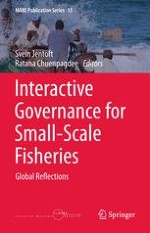2015 | OriginalPaper | Chapter
23. A Principle-Based Analysis of Multilevel Policy Areas on Inshore Fisheries in Newfoundland and Labrador, Canada
Authors : Andrew M. Song, Ratana Chuenpagdee
Published in: Interactive Governance for Small-Scale Fisheries
Publisher: Springer International Publishing
Activate our intelligent search to find suitable subject content or patents.
Select sections of text to find matching patents with Artificial Intelligence. powered by
Select sections of text to find additional relevant content using AI-assisted search. powered by
